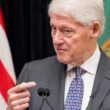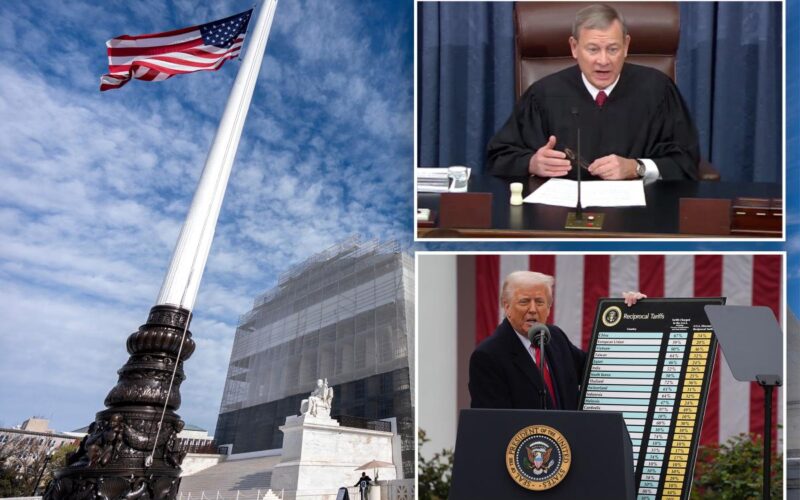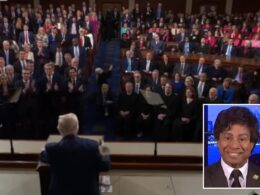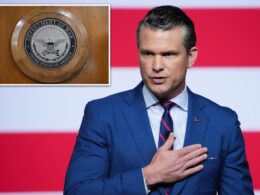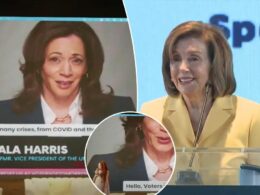Most of the nine justices on the Supreme Court expressed unease Wednesday about President Trump’s use of emergency powers to impose sweeping tariffs on foreign imports.
Republican-appointed justices joined their Democratic-appointed peers in hammering the administration’s representative with sharp questions about Trump invoking the International Emergency Economic Powers Act (IEEPA) to impose duties on dozens of countries.
“Congress, as a practical matter, can’t get this power back once it’s handed it over to the president,” conservative Justice Neil Gorsuch fretted during an exchange with Solicitor General John Sauer about the 1977 law.
“It’s a one-way ratchet toward the gradual but continual accretion of power in the executive branch and away from the people’s elected representatives.”
The consolidated case only deals with the IEEPA tariffs, which Trump used to apply broad, across-the-board levies — including a 10% baseline rate and an extra 10% on China for its role in shipping fentanyl to the US.
In a sign of how important the case is to the administration, Treasury Secretary Scott Bessent had a front row seat for oral arguments.
Bessent has hoped for a quick decision by the justices, stating in the administration’s submission to the high court that “delaying a ruling until June 2026 could result in a scenario in which $750 billion-$1 trillion in tariffs have already been collected, and unwinding them could cause significant disruption.”
So far, IEEPA tariffs have raised about $90 billion as of Sept. 30, according to data from US Customs and Border Patrol.
The law gives the president emergency powers to “investigate, block during the pendency of an investigation, regulate, direct and compel, nullify, void, prevent or prohibit … importation or exportation” of international commerce and is at the heart of trade agreements Trump has worked out with dozens of countries.
Critically, it doesn’t mention the word “tariff” and no president other than Trump has used the statute to impose duties.
“The phrase ‘regulate importation’ [in the law] plainly embraces tariffs, which are among the most traditional indirect methods of regulating importation,” Sauer argued. “IEEPA authorizes quotas and other tariff equivalents.”
Liberal Justice Sonia Sotomayor countered that “Congress has always used ‘regulate’ and ‘tax’ together in the code” and asked whether Sauer was contending that the “taxing reference is superfluous.” Sauer replied that IEEPA is a unique law with “a specific historical pedigree.”
“As I understand it, IEEPA was designed and intended to limit presidential authority,” Justice Ketanjii Brown Jackson contended at another point.
“Congress was concerned about how presidents had been using the authority under the predecessor statute TWEA [Trading with the Enemy Act of 1917], and it’s pretty clear that Congress was trying to constrain the emergency powers of the president.”
Elsewhere, Chief Justice John Roberts noted that, “The vehicle is imposition of taxes on Americans, and that has always been a core power of Congress.”
Roberts mused that “power to impose tariffs on any product, from any country, for any amount, for any length of time” seems like a “major authority,” a reference to the so-called “major questions” doctrine, which states that programs of “vast economic and political significance” must be approved by the legislative branch.
Justice Amy Coney Barrett had grilled Sauer on other instances “where that phrase ‘regulate importation’ has been used to confer tariff-imposing authority.”
Sauer responded by pointing to the TWEA, which Richard Nixon used to impose 10% emergency tariffs on all imports in 1971.
When it came time to question the attorneys challenging Trump’s authority, Barrett seemed to agonize over a provision in IEEPA stating that a president “may prescribe, by means of licenses or otherwise, any transactions in foreign exchange.”
“This license thing is important to me, and do you agree that pursuant to IEEPA, the President could impose, could regulate commerce by imposing a license fee?” she asked plaintiff lawyer Neal Katyal.
Justice Brett Kavanaugh picked up on the Trump administration’s contention that the plaintiffs were arguing an “odd doughnut hole” exists in the law allowing the president to cut off trade entirely but not impose tariffs.
“Why would a rational Congress say, ‘Yeah, we’re going to give the president power to shut down trade’ — you’re admitting that power’s in there — ‘but can’t do a 1% tariff’?” he mused. “That doesn’t seem, but I want to get your answer, to have a lot of common sense behind it.”
Meanwhile, conservative Justices Samuel Alito and Clarence Thomas seemed to most overtly align with the Trump administration.
“Suppose that there was an imminent threat of war — not a declared war, but an imminent threat of war with a very powerful enemy whose economy was heavily dependent on US trade. Could a president, under this provision, impose a tariff as a way of trying to stave off that war?” Alito asked at one point.
Looming over the Supreme Court’s decision is the logistics of refunding the tariffs, which Barrett acknowledged would be “a complete mess.”
Should the Trump administration lose the case, senior White House trade adviser Peter Navarro has argued that the president could turn to other authorities, such as Section 301 of the Trade Act of 1974, to temporarily reimpose some levies.
The Trade Act gives the US Trade Representative power to “impose duties or other import restrictions … for such time as the Trade Representative determines appropriate” if they believe “an act, policy or practice of a foreign country is unjustifiable and burdens or restricts United States commerce.”
Two lower federal courts have determined that Trump lacks the power he cited under IEEPA to impose the “trafficking” and “reciprocal” tariffs.
A decision is expected by the end of June.
